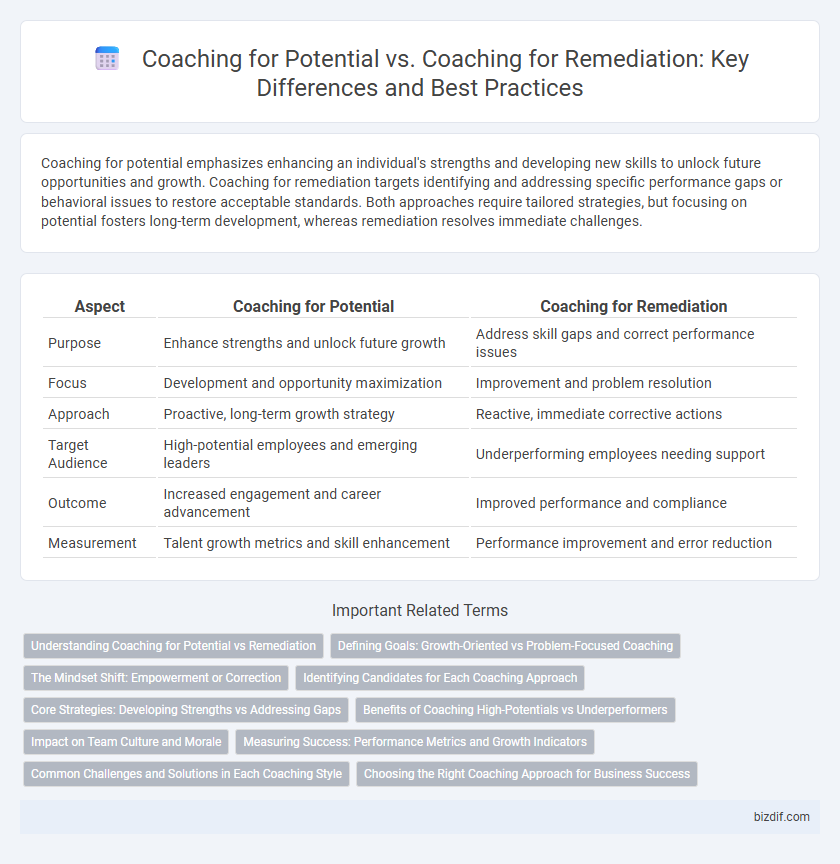Coaching for potential emphasizes enhancing an individual's strengths and developing new skills to unlock future opportunities and growth. Coaching for remediation targets identifying and addressing specific performance gaps or behavioral issues to restore acceptable standards. Both approaches require tailored strategies, but focusing on potential fosters long-term development, whereas remediation resolves immediate challenges.
Table of Comparison
| Aspect | Coaching for Potential | Coaching for Remediation |
|---|---|---|
| Purpose | Enhance strengths and unlock future growth | Address skill gaps and correct performance issues |
| Focus | Development and opportunity maximization | Improvement and problem resolution |
| Approach | Proactive, long-term growth strategy | Reactive, immediate corrective actions |
| Target Audience | High-potential employees and emerging leaders | Underperforming employees needing support |
| Outcome | Increased engagement and career advancement | Improved performance and compliance |
| Measurement | Talent growth metrics and skill enhancement | Performance improvement and error reduction |
Understanding Coaching for Potential vs Remediation
Coaching for potential focuses on unlocking an individual's strengths and fostering growth, enabling them to achieve higher performance and long-term success. Coaching for remediation targets specific weaknesses or performance gaps, aiming to correct behaviors and meet necessary standards. Understanding the distinction helps tailor coaching strategies that either enhance capabilities or address deficiencies effectively.
Defining Goals: Growth-Oriented vs Problem-Focused Coaching
Coaching for potential emphasizes setting growth-oriented goals that inspire continuous development, long-term success, and skill enhancement, while coaching for remediation concentrates on problem-focused goals aimed at correcting specific performance issues or behavioral challenges. Growth-oriented coaching fosters a proactive mindset, encouraging clients to explore new opportunities and expand capabilities beyond current limitations. In contrast, remediation coaching targets immediate obstacles to restore baseline performance and address critical deficiencies.
The Mindset Shift: Empowerment or Correction
Coaching for potential centers on empowerment by fostering growth mindsets, encouraging self-discovery, and amplifying strengths to unlock future possibilities. Coaching for remediation prioritizes correction by identifying skill gaps, addressing performance deficits, and implementing targeted interventions to improve current outcomes. Shifting the coaching mindset from remediation to potential transforms engagement, motivating individuals through inspiration rather than obligation.
Identifying Candidates for Each Coaching Approach
Identifying candidates for coaching involves assessing whether individuals exhibit growth potential or require remediation based on performance metrics and behavioral indicators. High-potential candidates demonstrate strong learning agility, motivation, and adaptability, making them ideal for developmental coaching that enhances skills and leadership capacity. Conversely, candidates needing remediation often show performance gaps, lack of engagement, or skill deficiencies, necessitating targeted coaching interventions to address specific challenges and improve outcomes.
Core Strategies: Developing Strengths vs Addressing Gaps
Coaching for potential centers on developing strengths by leveraging individual talents and fostering growth to maximize performance and leadership impact. In contrast, coaching for remediation targets addressing gaps by identifying skill deficiencies and implementing focused interventions to improve specific shortcomings. Both approaches utilize tailored feedback, goal setting, and continuous monitoring but differ fundamentally in their strategic focus and desired outcomes.
Benefits of Coaching High-Potentials vs Underperformers
Coaching high-potentials accelerates leadership development, enhances strategic thinking, and maximizes future organizational impact by nurturing existing strengths and ambition. In contrast, coaching underperformers focuses on addressing skill gaps, improving performance consistency, and reducing productivity risks, enabling them to meet baseline expectations. Investing in high-potential coaching yields long-term talent retention and innovation, whereas remediation coaching mitigates performance issues and stabilizes team dynamics.
Impact on Team Culture and Morale
Coaching for potential cultivates a growth mindset within teams, fostering innovation and higher engagement by recognizing and developing individual strengths. In contrast, coaching for remediation often addresses performance deficits, which can create a more cautious or defensive atmosphere if not handled sensitively. Prioritizing potential-focused coaching nurtures a positive team culture and boosts morale, while remediation coaching requires careful balance to maintain trust and motivation among team members.
Measuring Success: Performance Metrics and Growth Indicators
Coaching for potential emphasizes metrics such as skill acquisition rate, goal attainment, and long-term career progression, highlighting growth indicators like increased adaptability and leadership capacity. Coaching for remediation focuses on performance metrics including error reduction, compliance adherence, and immediate behavioral improvements to address specific deficiencies. Tracking these distinct performance indicators ensures tailored coaching strategies effectively support both developmental growth and corrective outcomes.
Common Challenges and Solutions in Each Coaching Style
Coaching for potential often faces challenges such as resistance to change and unclear goal-setting, which can be addressed by fostering a growth mindset and setting SMART objectives to drive motivation and clarity. In coaching for remediation, common obstacles include emotional barriers and skill deficits, resolved through empathetic communication and targeted skill development plans that rebuild confidence and competence. Tailoring feedback approaches to the individual's needs in both styles ensures more effective engagement and sustained improvement.
Choosing the Right Coaching Approach for Business Success
Coaching for potential emphasizes unlocking untapped talents and fostering growth opportunities, driving long-term business innovation and competitive advantage. Coaching for remediation targets specific performance gaps or behavioral challenges, ensuring immediate improvement and risk mitigation. Selecting the appropriate coaching approach hinges on aligning organizational goals with employee development needs to maximize business success and workforce effectiveness.
Coaching for Potential vs Coaching for Remediation Infographic

 bizdif.com
bizdif.com